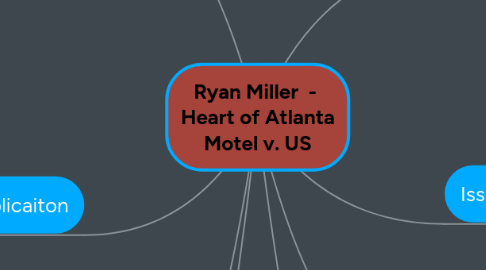
1. Rule of Law
1.1. Power of Congress to prohibit private businesses from choosing to discriminate based on race based on interstate commerce.
1.1.1. In passing the Act, Congress had established that black citizens were being harmed by discriminatory business practices.
1.1.2. Interstate travel of people qualifies as commerce.
1.1.3. The government had an interest in protecting these citizens' rights as well as in regulating interstate commerce.
1.1.4. The hotel (and restaurant) industries have been a prime example of this harm and demonstrably affect interstate commerce.
1.2. Power of Congress to deprive the hotel of private property without due process - 5th Amendment.
1.3. Power of Congress to for hotel into involuntary servitude - 13th Amendment.
2. Analysis/Applicaiton
2.1. Interstate Commerce
2.1.1. The Plaintiff argues that the hotel is local and does not engage in interstate commerce. The US argues that because 75% of guests are from other states and that the hotel advertises nationally, that they are an interstate business venture. The Court sides with the US.
2.1.2. The US argues and the Court agrees that Congress is permitted to regulate interstate commerce, including traveling citizens.
2.1.3. The Plaintiff argues that Congress' consideration of morality/racism invalidate the Act. The US and the Court disagree.
2.1.4. The Court agreed with the US, that the Heart of Atlanta motel was engaged in interstate commerce regardless of its locality. Thus, it can be regulated.
2.2. 5th Amendment
2.2.1. The Plaintiff argues that the Act does deprives the owner of property without due process. The US and the Court disagree.
2.3. 13th Amendment
2.3.1. The Plaintiff argues that the Act casts the owner into involuntary servitude. The US and the Court disagree.
3. Conclusion
3.1. The Supreme Court upheld the Act as constitutional, asserting that it is within the power of Congress to regulate interstate commerce. This includes harm done to a black interstate travelers as a result of discriminatory practices by those providing public accommodations.
4. Importance
4.1. This landmark case cemented the constitutionality of the Civil Rights Act of 1964, which made it illegal to engage in discriminatory business practices that had been prevalent prior to the Act's passage. Henceforth, race and other broad categories could not longer serve as the basis for decision making by business leaders. Today, all businesses must abide by EEO and Affirmative Action policies.
5. Facts
5.1. Parties
5.1.1. Heart of Atlanta Motel - Appelant
5.1.2. United States (acting on behalf of disaffected black consumers) - Appellee
5.2. What Happened
5.2.1. Congress passed Civil Rights Act of 1964 - Racial discrimination banned where it might interfere with interstate commerce.
5.2.2. Heart of Atlanta Motel continued to refuse black customers.
5.2.3. Heart of Atlanta Motel advertised nationally.
5.3. Procedural History
5.3.1. US District, Northern District of Georgia ruled against motel.
5.3.2. Case combined with Pickrick Restaurant, who also refused to serve black patrons. Appeals court ruled against businesses.
5.3.3. US Supreme Court heard/ruled on case in 1964 in favor of US, upholding Civil Rights Act of 1964.
6. Issues
6.1. Whether the Civil Rights Act of 1964 is an unconstitutional overreach by interfering in locally accepted practices of discrimination.
7. Impact
7.1. Business owners may not withhold public accommodations from those on the basis of race, religion, gender or other protected statuses.
7.1.1. Katzenbach v. McClung (also 1964)- similarly held that withholding service on the basis of race adversely impacts interstate commerce and is a violation of the Civil Rights Act of 1964. No one should ever be deprived of BBQ.
7.1.2. US v. Morrison - The Violence Against Women Act was enacted on the basis that Congress had the authority to federally regulate sexual assault as an issue of interstate commerce. The Supreme Court overturned the provision of VAWA that leaned on interstate commerce as its source of authority.
